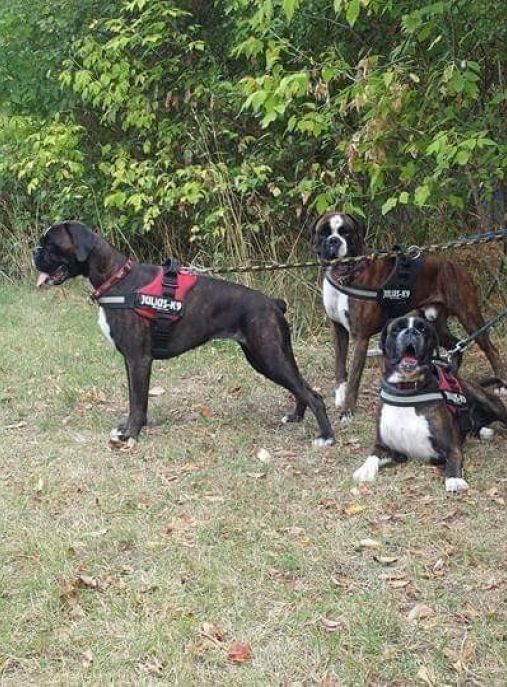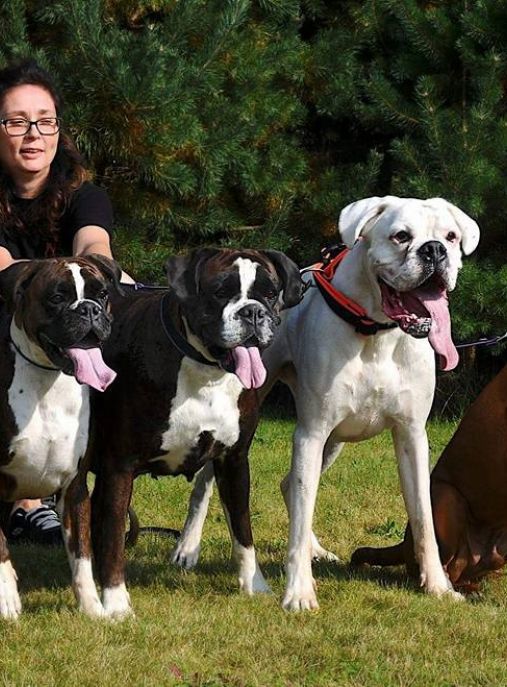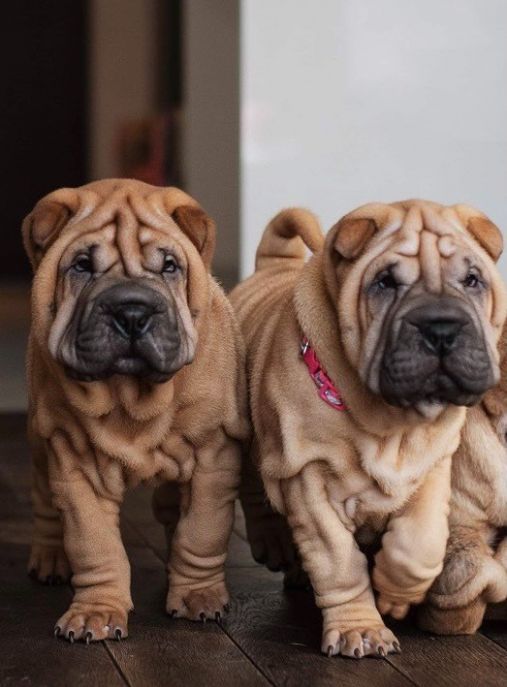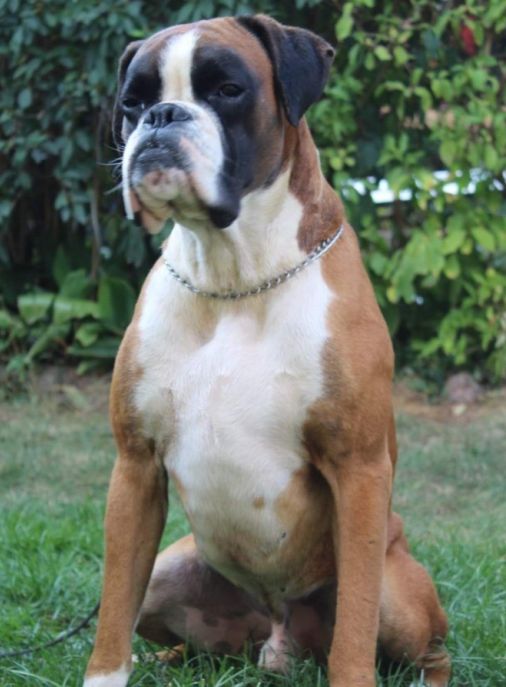The Boxer is a medium-sized, muscular and powerful dog breed known for its distinctive square-shaped head and strong jaw. With a playful and energetic nature, the Boxer is a beloved companion and a versatile working dog. This breed possesses a unique combination of strength, agility, and intelligence, making it a popular choice for various roles, including family pet, guard dog, and even therapy dog.
Originating in Germany, the Boxer breed has a rich history that dates back to the 19th century. It is believed to have descended from the now-extinct Bullenbeisser, a breed used for hunting large game. The Boxer's ancestors were also used in bull-baiting, a popular sport in Europe during that time. However, as bull-baiting was banned, the Boxer's purpose shifted towards being a versatile working dog.
According to the FCI (Fédération Cynologique Internationale) typology, the Boxer belongs to Group 2: Pinscher and Schnauzer - Molossoid breeds - Swiss Mountain and Cattle Dogs. Within this group, the Boxer is classified under Section 2.1: Molossoid breeds, Mastiff type. This classification highlights the Boxer's lineage and its similarity to other Molossoid breeds.
Boxers are known for their friendly and playful temperament, making them excellent family dogs. They are loyal and protective, making them great companions for children. Their high energy levels require regular exercise and mental stimulation to keep them happy and well-balanced. Due to their intelligence and trainability, Boxers are often used in various dog sports, such as obedience, agility, and tracking.
In terms of physical characteristics, male Boxers typically weigh between 65-80 pounds (30-36 kg), while females weigh slightly less, ranging from 50-65 pounds (23-29 kg). The height at the shoulder for males is around 22-25 inches (56-63 cm), and for females, it is slightly lower, ranging from 21-24 inches (53-61 cm). The Boxer's coat is short, smooth, and shiny, usually coming in fawn or brindle colors, with or without white markings.
The average lifespan of a Boxer is around 10-12 years, although with proper care and a healthy lifestyle, some individuals can live even longer. It is important to note that Boxers are prone to certain health issues, including hip dysplasia, heart conditions, and certain types of cancer. Regular veterinary check-ups and a balanced diet are crucial for maintaining their overall well-being.
One interesting fact about Boxers is their expressive faces. Their wrinkled forehead and dark, soulful eyes give them a unique and endearing appearance. Additionally, Boxers are known for their "wiggle butt" behavior, where they wag their entire rear end when excited or happy, showcasing their joyful and exuberant nature.
In conclusion, the Boxer is a remarkable breed with a fascinating history and a versatile nature. Whether as a loyal family companion, a reliable working dog, or a therapy dog, the Boxer's strength, intelligence, and affectionate personality make it a cherished member of many households around the world.

Boxer dogs are known for their distinctive appearance and energetic personalities. With their strong build, square-shaped head, and expressive eyes, they exude a sense of strength and intelligence. However, beneath their muscular exterior lies a gentle and affectionate nature that endears them to dog lovers worldwide.
One of the most prominent traits of Boxers is their boundless energy. They are highly active dogs that require regular exercise to keep them happy and healthy. Whether it's a long walk, a game of fetch, or a run in the park, Boxers thrive on physical activity. This energy also translates into their playfulness, making them excellent companions for families with children or other pets.
Despite their playful nature, Boxers are incredibly loyal and protective. They form strong bonds with their families and are known to be excellent watchdogs. Their alertness and natural instinct to protect make them an ideal choice for those seeking a reliable and vigilant companion. However, it is essential to socialize them from an early age to ensure they are comfortable around strangers and other animals.
Boxers are intelligent dogs that are eager to please their owners. This makes them highly trainable, but it also means they require consistent and positive reinforcement. Early obedience training is crucial to channel their energy and prevent any potential behavioral issues. With the right approach, Boxers can excel in various activities, including agility, obedience, and even therapy work.
While Boxers are generally friendly and outgoing, they can also be stubborn at times. Patience and firmness are key when training them, as they respond best to positive reinforcement techniques. Harsh training methods or punishment can lead to fear or aggression, which is not reflective of their true nature.
Proper socialization is vital for Boxers to develop into well-rounded dogs. Exposing them to different environments, people, and animals from a young age will help them become more confident and adaptable. It is also important to provide mental stimulation through interactive toys, puzzles, and training exercises to prevent boredom and destructive behavior.
Boxers are known for their love and affection towards their families. They thrive on human companionship and can suffer from separation anxiety if left alone for extended periods. They are happiest when they are included in family activities and given plenty of attention and affection.
In conclusion, Boxers are energetic, loyal, and intelligent dogs that make excellent companions for active families. With proper training, socialization, and lots of love, they can grow into well-behaved and loving pets. Their playful nature, combined with their protective instincts, makes them a popular choice for those seeking a devoted and fun-loving canine companion.
Boxer dogs are known for their playful and energetic nature, making them a popular choice for families and individuals alike. To ensure the well-being and happiness of your Boxer, it is essential to provide them with proper care and attention. Here is an extensive description of recommended care for Boxer dogs, including tips on what to do and what not to do.
1. Exercise: Boxers are highly active dogs that require regular exercise to maintain their physical and mental health. Aim for at least 60-90 minutes of exercise daily, including walks, runs, and playtime. Engage them in activities that challenge their agility and intelligence, such as obedience training or agility courses.
2. Mental Stimulation: Boxers are intelligent dogs that thrive on mental stimulation. Provide them with puzzle toys, interactive games, and training sessions to keep their minds engaged. This will prevent boredom and destructive behavior.
3. Diet and Nutrition: Feed your Boxer a balanced and nutritious diet to support their overall health. Choose high-quality dog food that meets their specific needs, considering their age, size, and activity level. Avoid overfeeding, as Boxers are prone to weight gain, which can lead to health issues.
4. Grooming: Boxers have a short coat that requires minimal grooming. Brush their coat once a week to remove loose hair and keep their skin healthy. Regularly check their ears for signs of infection and clean them as needed. Trim their nails regularly and brush their teeth to maintain good oral hygiene.
5. Socialization: Boxers are social dogs that thrive on human companionship. Expose them to various people, animals, and environments from an early age to ensure they grow up to be well-rounded and friendly. Enroll them in puppy socialization classes and organize playdates with other dogs.
6. Training and Obedience: Boxers are intelligent and eager to please, making them relatively easy to train. Start training early and use positive reinforcement techniques such as treats, praise, and play. Consistency and patience are key to successful training. Teach them basic commands like sit, stay, and come, as well as proper leash manners.
7. Health Care: Regular veterinary check-ups are crucial for maintaining your Boxer's health. Vaccinations, parasite prevention, and dental care should be a part of their routine healthcare. Boxers are prone to certain health issues like hip dysplasia, heart conditions, and allergies. Be vigilant about any signs of discomfort or illness and seek veterinary attention promptly.
What to do:
- Provide ample exercise and mental stimulation to keep them happy and healthy.
- Offer a balanced and nutritious diet suitable for their age and activity level.
- Socialize them from an early age to ensure they are well-behaved and friendly.
- Train them using positive reinforcement techniques to establish good behavior.
- Regularly groom and maintain their hygiene to prevent skin and dental issues.
- Schedule regular veterinary check-ups and address any health concerns promptly.
What not to do:
- Do not leave your Boxer alone for extended periods as they thrive on human companionship.
- Avoid overfeeding or giving excessive treats, as Boxers are prone to weight gain.
- Do not use harsh training methods or punishment, as it can harm their sensitive nature.
- Avoid exposing them to extreme temperatures, as Boxers are susceptible to heatstroke.
- Do not neglect their dental care, as poor oral hygiene can lead to various health problems.
By following these tips and providing the recommended care, you can ensure that your Boxer dog leads a happy, healthy, and fulfilling life as a beloved member of your family.
The common color of Boxer dogs is a stunning shade known as fawn. This color is characterized by a warm, golden hue that ranges from a light tan to a deep reddish-brown. The fawn coloration is one of the most recognizable and beloved aspects of the Boxer breed, adding to their overall charm and appeal.
When describing the color of Boxer dogs, it is important to note that fawn can vary in intensity and shade. Some Boxers may have a lighter, almost sandy fawn color, while others may exhibit a richer, darker tone that resembles a chestnut or mahogany. The exact shade of fawn can also be influenced by factors such as genetics, lineage, and individual variations within the breed.
The fawn color of Boxer dogs is typically seen as a solid coat color, with minimal to no markings. However, it is not uncommon to find Boxers with white markings on their chest, paws, or face, which adds a touch of contrast to their overall appearance. These white markings can range from small patches to larger areas, and they often enhance the beauty and uniqueness of each individual Boxer.
One of the most striking features of the fawn color in Boxer dogs is its ability to highlight their muscular physique. The warm tones of fawn beautifully accentuate the well-defined muscles and athletic build that are characteristic of the breed. This coloration, combined with their strong, square-shaped head and expressive eyes, gives Boxers a regal and powerful presence.
In addition to their stunning coat color, Boxers also have a short and sleek coat texture, which further enhances the appearance of their fawn color. This smooth coat not only adds to their overall aesthetic appeal but also makes grooming relatively easy and low-maintenance.
The fawn color of Boxer dogs is not only visually appealing but also holds symbolic significance. It represents their friendly and affectionate nature, as well as their loyalty and devotion to their families. Boxers are known for their playful and energetic personalities, and the fawn color perfectly complements their joyful and exuberant disposition.
In conclusion, the common color of Boxer dogs is a captivating fawn shade that ranges from a light tan to a deep reddish-brown. This warm and golden hue beautifully showcases their muscular physique and adds to their overall charm and appeal. The fawn color, combined with their short and sleek coat texture, makes Boxers a visually striking and distinctive breed.
Boxer dogs are known for their strong and muscular build, energetic nature, and playful personality. However, like any other breed, they are susceptible to certain health issues that owners should be aware of. Proper care and regular veterinary check-ups are essential to ensure the overall well-being of these beloved pets.
One of the most common health concerns in Boxers is heart disease. Boxers are prone to a condition called dilated cardiomyopathy (DCM), which affects the heart's ability to pump blood effectively. Symptoms may include fatigue, coughing, difficulty breathing, and fainting. Regular cardiac screenings and a balanced diet rich in taurine, an amino acid essential for heart health, can help prevent or manage this condition.
Another prevalent health issue in Boxers is cancer. Lymphoma, mast cell tumors, and hemangiosarcoma are among the most common types seen in this breed. Early detection is crucial, so regular check-ups and routine screenings are recommended. Additionally, maintaining a healthy diet, providing regular exercise, and avoiding exposure to harmful chemicals or substances can help reduce the risk of cancer.
Boxers are also prone to various gastrointestinal issues, including gastric dilatation-volvulus (GDV), commonly known as bloat. This condition occurs when the stomach fills with gas and twists, leading to severe discomfort and potentially life-threatening consequences. Feeding smaller, frequent meals, avoiding exercise immediately after meals, and using elevated feeding bowls can help prevent bloat.
Skin allergies and dermatitis are frequently observed in Boxers. These dogs may develop allergies to certain foods, environmental factors, or even fleas. Regular grooming, including bathing and brushing, can help maintain healthy skin and coat. Additionally, identifying and avoiding allergens, providing a balanced diet, and using appropriate flea prevention methods are essential for managing skin allergies.
Hip dysplasia, a condition where the hip joint doesn't develop properly, is another health concern in Boxers. This can lead to pain, lameness, and arthritis. Responsible breeders perform hip evaluations on their breeding dogs to reduce the risk of passing on this condition. Regular exercise, maintaining a healthy weight, and providing joint supplements can help manage hip dysplasia in affected dogs.
To ensure the overall health of Boxers, regular veterinary check-ups are crucial. Vaccinations, parasite prevention, and dental care should be a part of their routine healthcare. A balanced diet, appropriate for their age and activity level, is essential to meet their nutritional needs. Regular exercise, both mental and physical, is vital to keep them stimulated and prevent obesity.
Boxers are a brachycephalic breed, meaning they have a shortened muzzle. This can lead to respiratory issues, such as brachycephalic airway syndrome. It is important to avoid excessive heat, provide adequate ventilation, and avoid strenuous exercise in hot weather to prevent respiratory distress.
In conclusion, while Boxers are generally healthy dogs, they are prone to certain health conditions that owners should be aware of. Regular veterinary care, a balanced diet, exercise, and preventive measures can help ensure the well-being of these wonderful companions. With proper care and attention, Boxers can live long, happy, and healthy lives.
Boxer dogs are known for their energetic and athletic nature, making their nutritional needs crucial for maintaining their health and well-being. Providing a balanced and appropriate diet is essential to support their active lifestyle and prevent potential health issues. Here is an extensive description of the nutrition of Boxer dogs, including advice on feeding and what to avoid.
Protein is a vital component of a Boxer's diet as it helps build and repair tissues, supports muscle development, and boosts the immune system. High-quality animal-based proteins like chicken, turkey, beef, and fish should form the foundation of their meals. Look for dog food that lists a named meat source as the first ingredient and avoid products with excessive fillers or by-products.
Fat is another essential nutrient for Boxers, providing them with a concentrated source of energy. Opt for healthy fats like fish oil, flaxseed oil, and chicken fat, which contain omega-3 and omega-6 fatty acids. These fats promote a healthy coat, aid in brain development, and support joint health. However, it's important to monitor fat intake to prevent obesity, as Boxers can be prone to weight gain.
Carbohydrates are a valuable energy source for Boxers, but it's crucial to choose complex carbohydrates that provide sustained energy rather than simple sugars. Whole grains like brown rice, oats, and quinoa are excellent options. Avoid foods with excessive amounts of corn, wheat, or soy, as these ingredients can cause allergies or digestive issues in some dogs.
Fruits and vegetables are beneficial for Boxers as they provide essential vitamins, minerals, and antioxidants. Incorporate a variety of these into their diet, such as carrots, sweet potatoes, blueberries, and spinach. However, be cautious with certain fruits like grapes, raisins, and avocados, as they can be toxic to dogs.
Feeding frequency is an important consideration for Boxers. Puppies require more frequent meals, typically three to four times a day, to support their rapid growth and development. As they mature, adult Boxers can transition to two meals a day. Avoid free-feeding or leaving food out all day, as it can lead to overeating and weight gain.
Portion control is crucial to prevent obesity, which can strain a Boxer's joints and increase the risk of other health issues. Follow the feeding guidelines provided by the dog food manufacturer, but also monitor your dog's body condition and adjust portions accordingly. If your Boxer becomes overweight, consult with a veterinarian to develop a weight management plan.
Hydration is often overlooked but is essential for a Boxer's overall health. Always provide fresh, clean water and ensure it is readily available throughout the day. Monitor your dog's water intake, especially during hot weather or after vigorous exercise, as Boxers can be prone to overheating.
Avoid feeding your Boxer table scraps or human food, as it can lead to nutritional imbalances and digestive issues. Some human foods, like chocolate, onions, garlic, and caffeine, are toxic to dogs and should be strictly avoided. Additionally, be cautious with treats and choose high-quality, nutritious options that contribute to their overall diet.
In conclusion, providing a well-balanced diet is crucial for the health and vitality of Boxer dogs. Focus on high-quality proteins, healthy fats, complex carbohydrates, and a variety of fruits and vegetables. Monitor portion sizes, avoid excessive fat intake, and ensure your Boxer has access to fresh water at all times. By following these guidelines and consulting with a veterinarian, you can ensure your Boxer receives the nutrition they need to thrive.


























